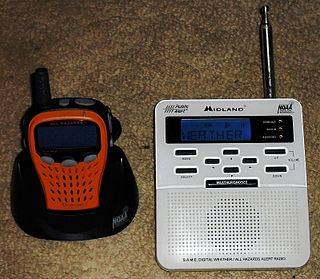The term "early warning" may refer to
Airborne Warning and Control System, or AWACS, may refer to:
Commercial may refer to:
SD may refer to:
AEW or aew may refer to:

The National Weather Service (NWS) is an agency of the United States federal government that is tasked with providing weather forecasts, warnings of hazardous weather, and other weather-related products to organizations and the public for the purposes of protection, safety, and general information. It is a part of the National Oceanic and Atmospheric Administration (NOAA) branch of the Department of Commerce, and is headquartered in Silver Spring, Maryland, within the Washington metropolitan area. The agency was known as the United States Weather Bureau from 1890 until it adopted its current name in 1970.

NOAA Weather RadioNWR; also known as NOAA Weather Radio All Hazards is an automated 24-hour network of VHF FM weather radio stations in the United States (U.S.) that broadcast weather information directly from a nearby National Weather Service office. The routine programming cycle includes local or regional weather forecasts, synopsis, climate summaries or zone/lake/coastal waters forecasts. During severe conditions the cycle is shortened into: hazardous weather outlooks, short-term forecasts, special weather statements or tropical weather summaries. It occasionally broadcasts other non-weather related events such as national security statements, natural disaster information, environmental and public safety statements, civil emergencies, fires, evacuation orders, and other hazards sourced from the Federal Communications Commission's (FCC) Emergency Alert System. NOAA Weather Radio uses automated broadcast technology that allows for the recycling of segments featured in one broadcast cycle seamlessly into another and more regular updating of segments to each of the transmitters. It also speeds up the warning transmitting process.
Red Alert or red alert may refer to:
RFE may refer to:
The four-minute warning was a public alert system conceived by the British Government during the Cold War and operated between 1953 and 1992. The name derived from the approximate length of time from the point at which a Soviet nuclear missile attack against the United Kingdom could be confirmed and the impact of those missiles on their targets. The population was to be notified by means of air raid sirens, television and radio, and urged to seek cover immediately. In practice, the warning would have been more likely three minutes or less.
SVR may refer to:

An emergency population warning is a method whereby local, regional, or national authorities can contact members of the public en masse to warn them of an impending emergency. These warnings may be necessary for a number of reasons, including:
TPWS may refer to:
Warning may refer to:

A weather radio is a specialized radio receiver that is designed to receive a public broadcast service, typically from government-owned radio stations, dedicated to broadcasting weather forecasts and reports on a continual basis, with the routine weather reports being interrupted by emergency weather reports whenever needed. Weather radios are typically equipped with a standby alerting function—if the radio is muted or tuned to another band and severe weather bulletin is transmitted, it can automatically sound an alarm and/or switch to a pre-tuned weather channel for emergency weather information. Weather radio services may also occasionally broadcast non-weather-related emergency information, such as in the event of a natural disaster, a child abduction alert, or a terrorist attack.
SPEW may refer to:
Armavir may refer to:

The 2008 Pacific typhoon season was a below average season which featured 22 named storms, eleven typhoons, and two super typhoons. The season had no official bounds; it ran year-round in 2008, but most tropical cyclones tend to form in the northwestern Pacific Ocean between May and November. These dates conventionally delimit the period of each year when most tropical cyclones form in the northwestern Pacific Ocean.
Imminence or Imminent may refer to:
EWS may refer to:
Air control may refer to: